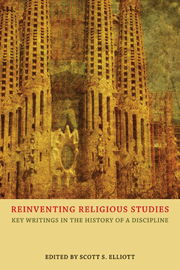Book contents
- Frontmatter
- Contents
- Introduction
- 1 For such a time as this: the Council of Societies for the Study of Religion, 1969–2009
- Part I Inventing and reinventing the field of religious studies
- Part II Method and theory in religious studies
- 9 Neutrality in the study of religion
- 10 Assessing social-scientific theories of religion
- 11 Playing hardball in religious studies
- 12 The academic study of religion: a methodological reflection
- 13 Fending off the social sciences
- Part III Teaching religion
- Part IV Women and the bible in religious studies
- Part V Religion and religious studies in civic life
- Part VI Religious studies and identity politics
- Part VII Islam and 9/11
- Bibliography
- Acknowledgments
- Index
13 - Fending off the social sciences
from Part II - Method and theory in religious studies
- Frontmatter
- Contents
- Introduction
- 1 For such a time as this: the Council of Societies for the Study of Religion, 1969–2009
- Part I Inventing and reinventing the field of religious studies
- Part II Method and theory in religious studies
- 9 Neutrality in the study of religion
- 10 Assessing social-scientific theories of religion
- 11 Playing hardball in religious studies
- 12 The academic study of religion: a methodological reflection
- 13 Fending off the social sciences
- Part III Teaching religion
- Part IV Women and the bible in religious studies
- Part V Religion and religious studies in civic life
- Part VI Religious studies and identity politics
- Part VII Islam and 9/11
- Bibliography
- Acknowledgments
- Index
Summary
Religionists deploy two strategies to fend off the social sciences: neutralizing the social sciences and embracing them. The first strategy, at once the more defiant and the more defensive, argues minimally that the social sciences can give only reductive, if not exclusively physicalist, answers to the key questions about religion: the questions of origin, function, meaning, and truth. For more radical religionists, the social sciences can answer only the questions of origin and function. For still others, the social sciences can answer none of the questions about religion because the social sciences study psychology, sociology, or anthropology rather than religion.
All versions of this first attempt to contain the social sciences are tenuous. To take the most extreme attempt first: to assert a priori that the social sciences study the mind, society, or culture rather than religion is conspicuously to beg the question. The true nature of religion is an open issue, one to be decided by the capacity or incapacity of social scientists to analyze religion psychologically, sociologically, or anthropologically.
The litany-like rejoinder that religion is religion the way literature is literature misses the point: not only is the nature of literature contested, but its nature is likewise determined by research. Literary critics not only debate the literariness of literature but do so by appealing to their capacity or incapacity to analyze it otherwise.
- Type
- Chapter
- Information
- Reinventing Religious StudiesKey Writings in the History of a Discipline, pp. 86 - 90Publisher: Acumen PublishingPrint publication year: 2013



